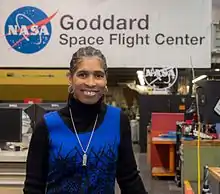Aprille Ericsson-Jackson
Aprille J. Ericsson-Jackson (born April 1, 1963)[1] is an American aerospace engineer.[2][3] Ericsson-Jackson is the first African-American woman to receive a Ph.D. in mechanical engineering from Howard University and the first African-American woman to receive a Ph.D. in Engineering at the National Aeronautics and Space Administration (NASA) Goddard Space Flight Center (GSFC).
Aprille Ericsson-Jackson | |
|---|---|
 | |
| Alma mater | Massachusetts Institute of Technology - Bachelors of Aerospace Engineering Howard University Masters of Engineering, Ph.D in Mechanical Engineering/Aerospace |
| Scientific career | |
| Institutions | NASA Goddard Space Flight Center (GSFC) |
Early life
Aprille Ericsson-Jackson spent her childhood in Cambridge, Maryland , Later, she moved to the Bedford Stuyvesant neighborhood of Brooklyn, New York. She has said that her interest in aeronautics manifested at an early age; she recalled watching the Apollo missions when she was in the first grade.[4] In the summer of 1980, she attended MITES, a science outreach program for minority students at MIT.[5] She earned her Bachelor's of Science in Aeronautical/Astronautical Engineering at MIT in 1986.[6] She was then awarded a master's degree in engineering from Howard University in 1992, followed by a doctorate in mechanical engineering, the first African-American woman to do so.[7]
Career and Teaching
Soon after graduating from Howard University, Ericsson-Jackson accepted an Aerospace Engineer position at the NASA Goddard Flight Center in Maryland. Projects to which she has contributed include satellites that monitor the Earth; one such project, the Tropical Rain Measuring Mission, provides data on the atmospheric phenomena El Niño and La Niña and their effects on crop productivity.[7]
Ericsson-Jackson has worked in various groups within NASA, including the Robotics group and the Guidance Navigation & Control Discipline. Her work in the latter helps spacecraft stabilize and manage their orientation and position during missions. She has also worked on missions that send spacecraft to other bodies within the solar system; she supported development on instrumentation for the Lunar Reconnaissance Orbiter, which was launched in 2009.[8]
In addition to her roles as an engineer, Ericsson-Jackson has taught at Howard University and Bowie State University, leading courses in mathematics and mechanical engineering. She has also contributed instruction on Aerospace theory at HU Public Charter Middle School of Math and Science.[8]
Awards
- Women in Science and Engineering Award (1997)
- NASA Goddard Honor Award
- Washington Award (2016)
- Women’s Network - Top 18 Women Who Will Change the World
- Elected to the Howard University Board of Trustees (2004)
- National Society of Black Physicists Honor Award (2019)
References
- Betty Kaplan Gubert; Miriam Sawyer; Caroline M. Fannin, Distinguished African Americans in Aviation and Space Science, Westport, Conn. : Oryx Press, 2001, ISBN 1573562467; p. 118
- "Dr. Aprille Ericsson | USA Science and Engineering Festival". 2013-06-17. Archived from the original on 2013-06-17. Retrieved 2020-06-10.
- "Aprille J Ericsson Jackson". Women, Art & Technology. Retrieved 2020-06-10.
- "Dr. Aprille Ericsson". USASEF. Retrieved 2020-03-26.
- "Aprille Ericsson '86 at MITES, 1980 | MIT Black History". www.blackhistory.mit.edu. Retrieved 2020-06-10.
- Laurel, Capitol Technology University 11301 Springfield Road; or 1.800.950.1992, MD 20708 301 369 2800. "Aprille Ericsson-Jackson: Aerospace Engineer, and First African American Woman to Earn PhD's from Two Renowned Institutions". www.captechu.edu. Retrieved 2020-03-26.
- "'Read, Read, Read—Learn, Learn, Learn' (April 2001) - Library of Congress Information Bulletin". www.loc.gov. Retrieved 2020-03-26.
- "Aprille Ericsson-Jackson". www.nsbp.org. Retrieved 2020-03-26.